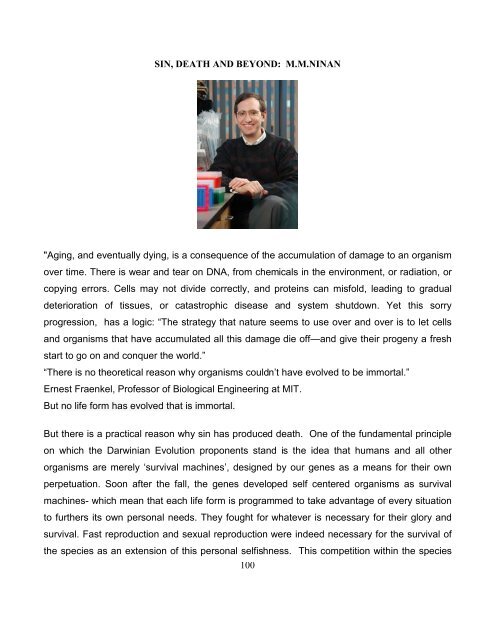Sin death and beyond
Create successful ePaper yourself
Turn your PDF publications into a flip-book with our unique Google optimized e-Paper software.
SIN, DEATH AND BEYOND: M.M.NINAN<br />
"Aging, <strong>and</strong> eventually dying, is a consequence of the accumulation of damage to an organism<br />
over time. There is wear <strong>and</strong> tear on DNA, from chemicals in the environment, or radiation, or<br />
copying errors. Cells may not divide correctly, <strong>and</strong> proteins can misfold, leading to gradual<br />
deterioration of tissues, or catastrophic disease <strong>and</strong> system shutdown. Yet this sorry<br />
progression, has a logic: “The strategy that nature seems to use over <strong>and</strong> over is to let cells<br />
<strong>and</strong> organisms that have accumulated all this damage die off—<strong>and</strong> give their progeny a fresh<br />
start to go on <strong>and</strong> conquer the world.”<br />
“There is no theoretical reason why organisms couldn’t have evolved to be immortal.”<br />
Ernest Fraenkel, Professor of Biological Engineering at MIT.<br />
But no life form has evolved that is immortal.<br />
But there is a practical reason why sin has produced <strong>death</strong>. One of the fundamental principle<br />
on which the Darwinian Evolution proponents st<strong>and</strong> is the idea that humans <strong>and</strong> all other<br />
organisms are merely ‘survival machines’, designed by our genes as a means for their own<br />
perpetuation. Soon after the fall, the genes developed self centered organisms as survival<br />
machines- which mean that each life form is programmed to take advantage of every situation<br />
to furthers its own personal needs. They fought for whatever is necessary for their glory <strong>and</strong><br />
survival. Fast reproduction <strong>and</strong> sexual reproduction were indeed necessary for the survival of<br />
the species as an extension of this personal selfishness. This competition within the species<br />
100


















